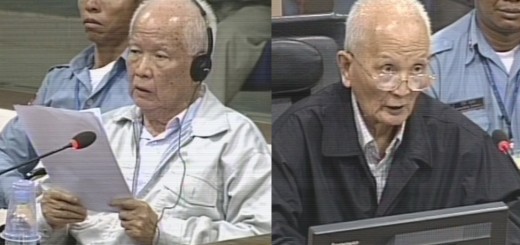Breaking
Cambodia tribunal convicts Khmer Rouge leaders

Khieu Samphan and Nuon Chea (Photo courtesy of the Cambodia Tribunal Monitor)
PHNOM PENH, Cambodia — Three and a half decades after the fall of Cambodia’s Khmer Rouge, a U.N.-backed tribunal on Thursday sentenced two top leaders of the former regime to life in prison for crimes against humanity during the country’s 1970s reign of terror that left close to 2 million people dead.
The historic verdicts were announced against Khieu Samphan, the regime’s 83-year-old former head of state, and Nuon Chea, its 88-year-old chief ideologue – the only two surviving leaders of the regime left to stand trial.
The tribunal’s chief judge, Nil Nonn, asked both men to rise for the verdicts but the frail Nuon Chea, wearing dark sunglasses, said he was too weak to stand from his wheelchair and was allowed to remain seated.
Nil Nonn said both men were guilty of “extermination encompassing murder, political persecution, and other inhumane acts comprising forced transfer, enforced disappearances and attacks against human dignity.”
There was no visible reaction from either of the accused, both of whom have denied wrongdoing. The rulings can be appealed, but Nil Nonn told the court that “given the gravity of the crimes” both would remain in detention.
The case, covering the forced exodus of millions of people from Cambodia’s towns and cities and a mass killing, is just part of the Cambodian story.
Nearly a quarter of the population – about 1.7 million people – died under rule of the Khmer Rouge through a combination starvation, medical neglect, overwork and execution when the group held power in 1975-79.
Survivors of the regime traveled from across the country to witness the historic day, filling several hundred seats available to the public at the tribunal. After the verdict was read, many said they felt mixed reactions and questioned if any punishment could fit the crimes committed by the Khmer Rouge.
“The crimes are huge, and just sentencing them to life in jail is not fair,” said 54-year-old Chea Sophon, who spent years in hard labor camps building dams and working in rice fields. His brother was killed during the Khmer Rouge era.
“But what can I do? I just accept the verdict,” he said, but then added, “Even if they die many times over, it would not be enough.”
Tribunal spokesman Lars Olsen called it “a historic day for both the Cambodian people and the court. The victims have waited 35 years for legal accountability, and now that the tribunal has rendered a judgment, it is a clear milestone.”
Many have criticized the slow justice, however, and its cost.
The tribunal, formally known as the Extraordinary Chambers in the Courts of Cambodia and comprising of Cambodian and international jurists, began operations in 2006. It has since spent more than $200 million, yet it had convicted only one defendant – prison director Kaing Guek Eav, who was sentenced to life imprisonment in 2011.
The current trial began in 2011 with four senior Khmer Rouge leaders; only two remain. Former Foreign Minister Ieng Sary died in 2013, while his wife, Social Affairs Minister Ieng Thirith, was deemed unfit to stand trial due to dementia in 2012. The group’s top leader, Pol Pot, died in 1998.
Khieu Samphan has acknowledged that mass killings took place. But testifying before the court in 2011, he claimed he was just a figurehead who had no real authority. He denied ordering any executions himself, calling the allegations a “fairy tale.” Instead, he blamed Pol Pot for its extreme policies.
Nuon Chea, who is known as Brother No. 2 for being Pol Pot’s trusted deputy, had also denied responsibility, testifying in 2011 that Vietnamese forces – not the Khmer Rouge – had killed Cambodians en masse. “I don’t want them to believe the Khmer Rouge are bad people, are criminals,” he said of those observing to the trial. “Nothing is true about that.”
Because of the advanced age and poor health of the defendants, the case against them was divided into separate smaller trials in an effort to render justice before they die.
Both men now face a second trial that is due to start in September or October, this time on charges of genocide, Olsen said. That trial is expected to take years to complete.
Amnesty International called the verdict “a crucial step toward justice.” But it also noted several “troubling” obstacles the tribunal faced – including the refusal of senior Cambodian government officials to give evidence and allegations of political interference. It called for the remaining cases to be completed “in a timely and fair manner without political interference.”
A female survivor, 58-year-old Khuth Vouern, said she felt a sense of relief that justice was finally served, even if it was generations late.
“I have been waiting for this day for many years,” said the woman, whose husband and several other family members were killed during the Khmer rouge reign. “Now, for the first time, my mind feels at least some degree of peace.”
Associated Press writer Jocelyn Gecker in Bangkok, Thailand, contributed to this report.





















